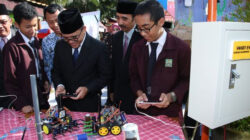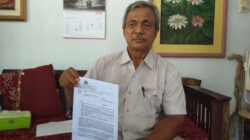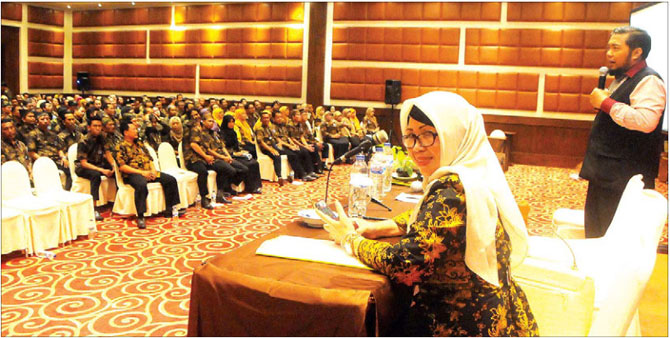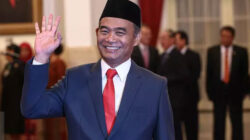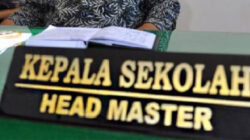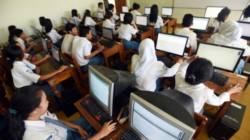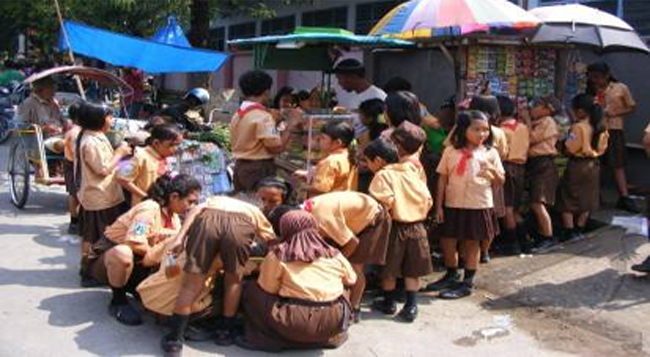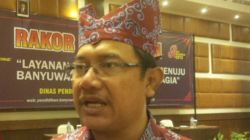BANYUWANGI – Upaya Pemerintah Kabupaten Banyuwangi memenuhi kekurangan jumlah tenaga guru terus berjalan. Selain tetap memanfaatkan tenaga Guru Tidak Tetap (GTT) dan pengusulan formasi guru dengan jumlah banyak sebagai calon pegawai negeri sipil (CPNS) tahun depan, Dinas Pendidikan bersama USAID merancang peraturan bupati (perbup) tentang penataan, pemindahan, dan pemerataan, guru di Banyuwangi.
Dalam draf perbup tersebut, Dispendik berupaya mengefektifkan sumber daya guru yang saat ini ada. Draf yang direvisi di hadapan para stakeholder dunia pendidikan tersebut akan mengoptimalkan tenaga guru PNS dan K2 dengan cara merotasi mereka.
Rotasi itu disesuaikan kebutuhan dan berdasar kesadaran masing-masing guru dalam memenuhi kekurangan tenaga pendidik profesional yang ada. Kepala Dinas Pendidikan Banyuwangi, Sulihtiyono, melalui Sekretaris Dispendik, Dwi Yanto, menjelaskan bahwa poin penting yang terdapat di dalam perbup tersebut adalah rotasi guru yang bertugas selama lima tahun atau lebih di satu sekolah.
Hal tersebut menurutnya menjadi inovasi dalam dunia pendidikan demi memenuhi kekurangan. Namun, dia menegaskan, mutasi tersebut bukanlah sebuah sanksi bagi guru. Itu upaya agar para guru terus dapat kualitasnya dan kualitas sekolah tempat mengajar.
Menurut Dwi, Banyuwangi masih kekurangan tenaga guru, khususnya guru kelas untuk sekolah dasar, guru mata pelajaran bahasa Indonesia, guru agama, dan guru olahraga. Dengan mutasi semacam itu, kata dia, sekolah bisa memenuhi kekurangan guru yang ada di tempatnya.
Selain itu, Dwi berpendapat bahwa kualitas sekolah dapat merata dengan penerapan mutasi tersebut. Sebab, selama ini sekolah favorit banyak diisi guru yang memiliki kualitas baik. Dengan mutasi tersebut, semua sekolah memiliki kesempatan dikembangkan oleh guru yang memiliki kualitas yang sama dengan sekolah favorit.
“Mutasi ini kita harapkan bisa swalayan, jadi untuk guru yang sudah tahu jika masa kerjanya di satu sekolah ada lima tahun, dia bisa bergantian dengan temannya dari sekolah lain untuk bertukar,” jelas Dwi.
Terkait status GTT dalam mutasi tenaga guru, Dwi mengatakan, sementara ini yang difokuskan adalah PNS, K2 CPNS, dan K2. Karena merekalah yang memperoleh insentif dari pemerintah. Sedandcan untuk GTT, mengacu pada PP48 tahun 2005, Dispendik belum dapat memberlakukan poin dalam draf tersebut jika nanti disahkan.
“Kebijakan mutasi nanti tetap diatur pemerintah, tapi kita yang mengatur sistemnya, dengan koridor jarak mutasi tidak lebih dari 15 kilometer. Antara tahun 2008-2010 silam kita juga menerapkan mutasi tapi dengan sistem lelang,” ujarnya.
Sementara itu, Provincial Governance & Manager Specialist USAID-Prioritas, Adri Budi Sulistyo, menambahkan bahwa poin mutasi guru jika terealisasi akan menjadi sebuah gebrakan kebijakan.
Oleh karena itu, menurutnya draf perbup itu perlu pengawalan. Dia melihat jika pertukaran guru antar instansi sekolah dapat dilaksanakan, maka bisa meningkatkan mutu pendidikan.
Selama ini mutasi menurutnya masih seputar di dalam wilayah kabupaten. Dengan mutasi kepala sekolah ke luar daerah dan guru antar sekolah akan terjadi penularan dampak positif.
Selain itu, hal tersebut juga dapat mengurangi dampak guru dominan karena sudah puluhan tahun menetap di satu sekolah. “Kita bisa gunakan metode karambol, jadi guru akan terus beradaptasi dan dapat menularkan pengalaman mereka dari tempat sebelumnya,” ujar Adri.
Selain itu, dalam draf tersebut juga dibahas optimalisasi K2 non-PNS supaya memperoleh insentif yang lebih baik. Mereka nanti juga dituntut meningkatkan kualifikasi. (radar)



